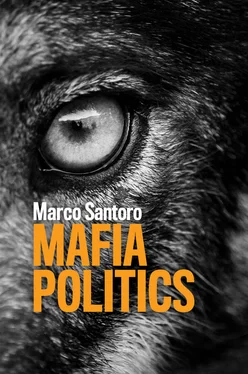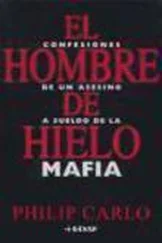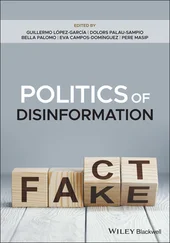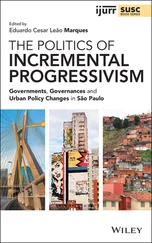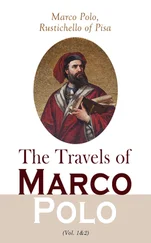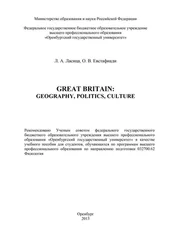At risk of being repetitive, a warning is necessary at this point in order to prevent possible objections and even misunderstandings – and the book elaborates on this, as it is a crucial theoretical element of the whole argument. Contrary to what our received wisdom might suggest, to say that mafia is of a political nature is not the same as advancing an equation between the mafia and the state – a common stance in the past, especially among lawyers and jurists. Indeed, this book argues that the mafia is very different from the state, even if they can both be placed in the sphere of politics. But the state, as a historical institution, has not monopolized politics, and politics may be organized in many other ways (see Masters 1989; Poggi 1991; Schmitt 1996 [1932]). To be sure, the equation of mafia with the state has been strongly criticized by many scholars in recent decades, including the promoters and supporters of an economic theory of the mafia who conceive of it as an industry for private protection. This book maintains that they are right in saying that the mafia is different from the state, but that they go too far when they infer from this that the mafia is ‘a specific economic enterprise’ (Gambetta 1993, 1).
Mafia may be an enterprise, but it is far from patently obvious that it is an economic enterprise. It is one thing to say that mafiosi ‘produce and promote’ something like protection, but it is quite another to say that they also sell what they produce and promote. Production is such a general category of social life that anything humans do can be subsumed under this rubric: from culture to deviance to space. Promotion is a communicative function that can work in any setting, from industry to social movements to family. On the contrary, selling is a much more specific activity, which presumes the existence of a market and the working of a commoditization process – something that has only occurred in certain places and times, and with reference to certain goods (e.g., Sassatelli 2007). As I will show, mafiosi do not sell; they simply give their ‘help’, they offer their ‘support’, while ritually emphasizing their disinterest; characteristically, they make gifts. And a gift is a totally different thing from a commodity (Mauss 1990 [1925]; Bourdieu 1980, 1996 [1992], 2017; Gregory 1982; Godbout and Caillé 1998; Godelier 1999; Silber 2009; Liebersohn 2011; Caillé 2020).
To insist that ‘mafia’ is not to be mistaken for the state does not mean that the state is irrelevant for the understanding of mafia. As the currently dominant, most legitimate mode of political organization worldwide, the (modern, originally European) state is clearly the necessary reference point for any understanding of the mafia – be this framed in political terms, as suggested here, or in criminological and/or economic terms, as maintained by current scholarship. What is crime and what belongs to economics instead of politics is contingent upon the state and its workings. A close look at the state as a historically grounded political institution should therefore be pivotal in any serious analysis of the mafia. However, this is an intellectual gambit that current scholarship on mafia rarely makes, preferring to move from implicit and normative ideas of the state. The consequence is that, even in the best literature, a sociology of the mafia is contrasted with a philosophy of the state – leaving the state, as it were, in the heaven of pure ideals and forms while firmly locating the mafia in the dirty, material ground. The absence of the state was normal in the social sciences in the 1950s to 1970s – the same period in which mafia studies developed (e.g., Hobsbawm 1959; Hess 1970; Schneider and Schneider 1976; Arlacchi 1983a; for partial exceptions, see Blok 1974; Sabetti 1984). It is less acceptable in current scholarship, after the ‘return of the state’ occurred in the 1980s (e.g., Almond 1988; Spruyt 2002). We could say that, in mafia studies, the state still needs to be brought back in (Evans et al. 2010 [1985]).
This book aims to facilitate this move, and argues for the adoption of a heuristic symmetry in the study of the mafia. 4What new light could be shed on the mafia if we put aside the normative claims of the (European, liberal, modern) state and look at both the mafia and the state in truly sociological, i.e. empirically disenchanted, terms? What new light could be shed on the mafia if we put the state, with its normative claims, in brackets and problematize our hopes for the advent of a never fully gained ‘modernity’? What light could we shed on the mafia if we consider the idea that politics includes the voices and actions of subalterns (Guha 1999 [1983]; Rancière 1998; Scott 1985, 1990), and accept that people coming from the subaltern classes may become dominant in certain conditions – not necessarily backed by the state’s laws and codes – while remaining faithful to their social and cultural background?
These are the questions from which this book springs. In replying, it argues that what we name ‘mafia’ may be conceived of as a special mode of political organization whose institutional logic can be identified through a comparison with other (equally historical) modes – such as the (territorial, sovereign, and originally European) state, the city-state, the city-league, various patrimonial forms of administration, and more primitive forms of political organization such as the chiefdom. While identifiable with none of those, the mafia draws elements, techniques and mechanisms from many of them, in an institutional synthesis that may really be considered as a masterwork of (collective and individual) social engineering.
The words ‘mafia’ and ‘mafiosi’
The origins of the name ‘mafia’ remain rather obscure. A number of hypotheses exist, some of them more persuasive than others. The confusion started in the very early days after Italian unification (1861), when suggestions about the original meaning and the linguistic roots of the word made their first appearance. Strange as it may seem, no written evidence of the word exists before Italian unification; indeed, dictionaries of the time did not hesitate to attribute the matrix of the name to northern Italian dialect – be it the Piedmontese or the Tuscan vernacular. At least on this point some agreement has been reached relatively quickly: no one would object anymore to the fact that ‘mafia’ is a Sicilian word that existed well before Italian unification – even if how much before is far from clear, given that the etymological roots of the word are not clear. The first documented occurrence of the term dates back to 1865, when the word was evoked in an official, but not public, report by a Piedmontese officer to account for everything against the new government that could be said to exist in Sicily – including anarchists and socialists. The first authoritative testimony about the word and its social uses in common speech dates back to 1889. According to the influential Sicilian folklorist Giuseppe Pitrè (1841–1916), the adjective mafiusu (in Italian translated as ‘mafioso’) was in use in his Palermo neighbourhood when he was a child, with the meaning of ‘cute’, ‘smart’, ‘well done’ (Pitrè 1889, 2008). No immediate connection with crime existed at the time, according to this authoritative source. In fact, the source of the association with the criminal world of what was previously a word with aesthetic and maybe ethical connotations was a literary invention. In the early 1860s, a drama was written and performed in Palermo with the title of I mafiusi di la Vicaria , set in a prison (Vicaria was the traditional name of the prison building in Palermo) with a few prisoners as characters. This was a story of prison life and eventual redemption, in which a sort of local boss, after years spent in prison acting as the ‘provider of social order’, found a new civic consciousness once free. Originally staged in 1863 and performed in Sicilian theatres throughout that decade, the drama had some relevant success in the 1880s, even being represented in theatres in Rome. In sum, an event in the ongoing national public sphere was at the origin of an association – that of the name ‘mafia’ with a certain social phenomenology linked to the world of prisons and gangs – which would know further success in subsequent decades. With the massive Italian migration to the US, the word ‘mafia’ reached the other shores of the Atlantic, thereby starting its international circulation – a phenomenon we are still witnessing today.
Читать дальше
